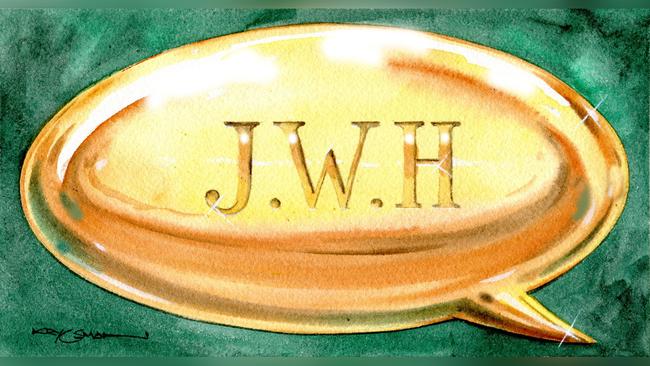
John Howard is unique as a prime ministerial speechmaker. He usually spoke from notes rather than a prepared text and made little use of speechwriters. Yet Howard was an effective communicator, sometimes a brilliant one, who struck a resonant chord with vast swathes of the electorate.
In an interview for this column, Howard said the key to effective speechmaking is that it must have a persuasive argument at its core. But the speechmaker must also be credible and authentic. Grand rhetoric is not enough to make a successful communicator.
“You’ve always got to see a speech as an instrument of persuasion,” Howard told me. “You persuade people in different ways: by an avalanche of facts, by inspirational words, and by humour, irony and ridicule.
“It depends on the circumstances and what method you use. You can persuade an audience if you are authentic. You are not going to persuade with rhetoric alone. You can cheer them up, inspire them, encourage them. But to actually persuade them to a particular point of view, you’ve got to advance a reason.”
A selection of Howard’s speeches has been collated in a new book edited by David Furse-Roberts, Howard: The Art of Persuasion (Jeparit Press). It will be launched by Josh Frydenberg in Melbourne today and by Angus Taylor in Sydney tomorrow.
Howard identifies several influences on his speechmaking. As a boy he played a gramophone record of Winston Churchill’s speeches and listened to Robert Menzies address parliament on the radio. School debating taught him the critical skill of being able “to deliver speeches in an impromptu fashion”. It made him one of the best parliamentary debaters of his generation.
Howard recalled seeing Menzies and John Gorton speak at a suburban hall, a form of speechmaking now largely long gone. “Once television arrived, it altered the context in which so many speeches were delivered,” he says. Billy McMahon never came across well on television. Howard would know: he worked the autocue for McMahon during the 1972 election campaign.
He studied several prime ministers up close. Gough Whitlam was “a great extemporaneous speaker” and a “superior parliamentarian” to Malcolm Fraser, who “just about read everything”. Howard thought Bob Hawke “was never comfortable in parliament”. He said Paul Keating was a skilled parliamentarian and praised his speech for the Unknown Soldier in 1993 as “beautiful” prose.
The new book offers a valuable collection of prime ministerial speechmaking. There are detailed policy dissertations, shrewd political expositions and eloquent tributes. Two that stand out are Howard’s speech to the US congress on Australia-US relations in 2002 and at London’s Guildhall on the centenary of the Constitution in 2000.
Howard’s finest speech was delivered from notes in Bali after the bombings that killed 88 Australians in 2002. “We gather here in sorrow, in anguish, in disbelief and in pain,” he said. “The Australian spirit will remain strong and free and open and tolerant. I know that is what all of those who lost their lives would have wanted and I know it is what all of those who grieve for them would want.” Howard’s most courageous speech was to Victorian farmers on gun law reform in 1996. While wearing a bulletproof vest — which Howard now says was “a mistake” — he spoke of “the national good” that must guide all prime ministers. (The book includes Howard’s speech to parliament outlining the new laws.)
“Many of the people who had voted for us thought ‘we voted for this joker and he’s now taking away our guns’,” Howard said. “I was absolutely determined not to back down. If we couldn’t stick to what we’d said on something like that, with a huge majority less than two months after we had been elected, then we weren’t going to be much good as a government.”
It is timely to re-read Howard’s election policy speech outlining the case for tax reform in 1998. The most effective political speech he gave was in 2001, when he extemporised on asylum-seeker policy: “We will decide who comes to this country and the circumstances in which they come.” Another game-changing speech was in 2004 when the contest against Mark Latham was defined as one about “trust”. It is a pity these last two are not in the book.
Howard’s most ill-judged speech was to a reconciliation convention in Melbourne in 1997. He was fired up and some in the audience turned their backs on him. “I didn’t handle that well,” he said. “I looked as though I had lost my temper and I overreacted to some interjections.”
The most difficult speech to re-read is Howard’s address to the nation on the case for invading Iraq in 2003. He said “the reason above all others” for disarming Iraq was its possession of weapons of mass destruction. They were never found. “It was based on the advice that we had and that advice turned out to be wrong,” Howard says.
There is much to learn from Howard, who believes politicians should speak more about their values. One of his “headland” speeches delivered after he returned to the Liberal leadership in 1995 is in the book. So are several that seek to reassert the party’s identity as the custodian of liberal and conservative values. They remain important touchstones for the party.
A speech remains the most important way that a politician can tie together their values into a framework for arguing a political point or presenting a policy idea. But speeches are losing their centrality to politics. Too many speeches make the eyes glaze over. The art of speech is being lost.
“There is some truth in that,” Howard told me. “It’s partly because of the diversification of the means of political communication. But politics is a contest of ideas. You’ve got to keep explaining the ideas about which the contest is occurring, and we don’t do that enough.”



To join the conversation, please log in. Don't have an account? Register
Join the conversation, you are commenting as Logout